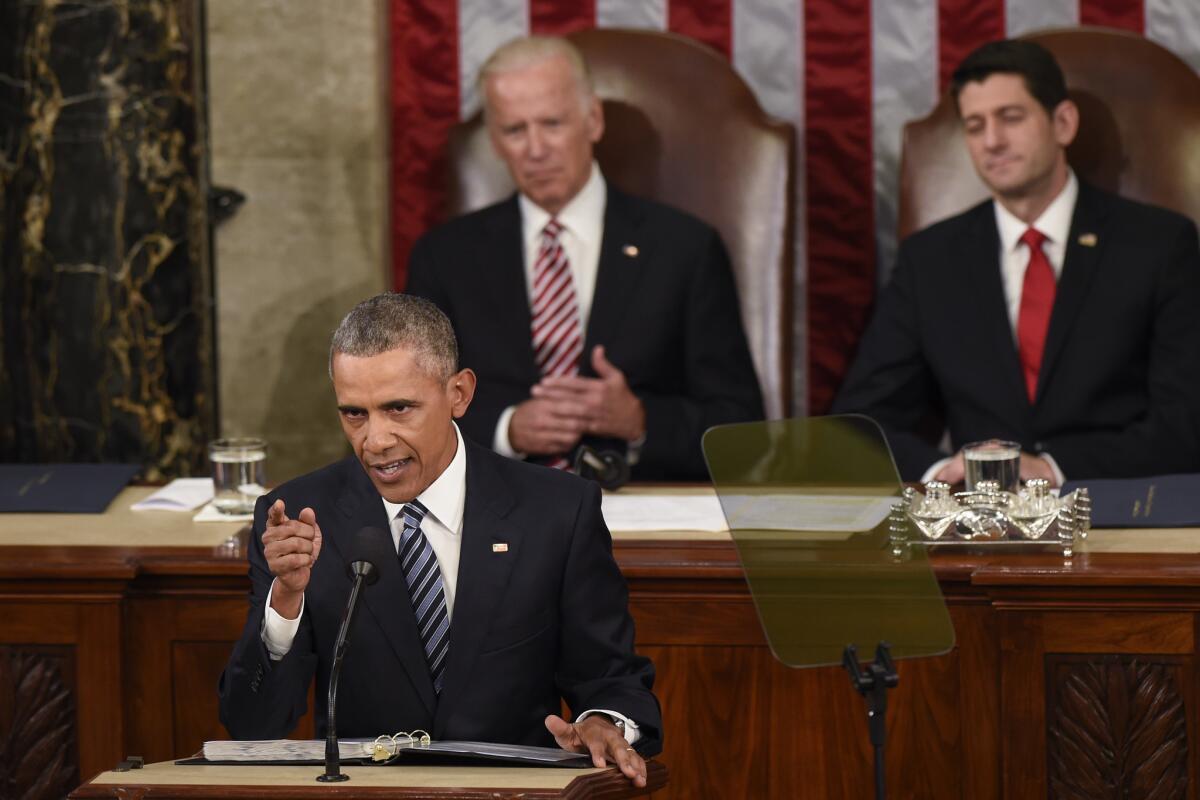Editorial: Obama’s unfinished business

President Barack Obama gestures while giving the State of the Union address before a joint session of Congress on Capitol Hill Jan. 12.
- Share via
Leading up to President Obama’s final State of the Union address, his aides suggested the speech would be less a laundry list of immediate legislative priorities than a celebration of the administration’s accomplishments so far and a call for long-term national unity.
Indeed, the speech contained an inventory of undoubted achievements, including the (admittedly protracted) recovery from what Obama rightly called “the worst economic crisis in generations,” the enactment of the Affordable Care Act and the negotiation of an agreement to restrict Iran’s nuclear program. These are significant and hard-won accomplishments, and the president was right to take pride in them.
But the “no laundry list” promise was only partly fulfilled, and Obama’s long-term focus often seemed to be on the next election — when those accomplishments could be reversed by a Republican in the House. The president reiterated, albeit in a perfunctory way, his support for immigration reform, new gun-control legislation, mandatory paid leave and an increase in the federal minimum wage. He surely knows that in the current, polarized political environment there is little chance of congressional Republicans embracing these priorities, or others such as closing the detention center at Guantanamo Bay, lifting the embargo against Cuba or reforming laws governing the financing of election campaigns.
More productively, Obama identified a handful of initiatives he supports that Congress might well address on a bipartisan basis and in the process “surprise the cynics.” One was reform of the federal criminal justice system, a cause that has united liberal Democrats and libertarian Republicans. Another was tax credits for poor working adults without children. To that agenda we would add Congress approving an Authorization for Use of Military Force against Islamic State, so that Obama’s campaign to “degrade and ultimately destroy” the self-styled caliphate is grounded in a contemporaneous vote of confidence from Congress.
In his speech, Obama promised to root out, hunt down and destroy these extremists without trapping the U.S. in a Vietnam-like quagmire, but he also renewed his call for a fresh authorization from Congress. Unfortunately, he undermined the urgency of that exhortation by suggesting the war would be prosecuted “with or without congressional action.”
In some ways, the most interesting and effective passages in Obama’s speech focused not on near-term policies or election-year politics but on realities that will outlast his presidency. In acknowledging that the recovery has not resonated for many Americans, the president pointed to profound technological and economic changes “that started long before the Great Recession hit and haven’t let up.”
Critics will accuse the president of seeking to deflect responsibility for the fact that many Americans blame him for the tepid recovery and the excruciatingly slow growth in most Americans’ incomes. (And Republicans will dismiss his belief that government can play a more prominent role in easing economic insecurity.) But Obama was pointing to a realities that pose a challenge to both parties and all schools of political thought.
Finally, every State of the Union address is in some sense a sermon, and Obama effectively preached against the intolerance and ugliness that have marred contemporary politics, including on the 2016 presidential campaign trail. He eloquently rebuked those who yearn for a return to an idealized American past.
“America has been through big changes before — wars and depression, the influx of immigrants, workers fighting for a fair deal, and movements to expand civil rights,” Obama said. “Each time, there have been those who told us to fear the future; who claimed we could slam the brakes on change, promising to restore past glory if we just got some group or idea that was threatening America under control.” If Donald Trump’s ears weren’t burning, they should have been.
A full year remains in the Obama presidency, and this speech showed that he believes that he — and Congress — have unfinished business. They should tend to it.
Follow the Opinion section on Twitter @latimesopinion and Facebook
More to Read
A cure for the common opinion
Get thought-provoking perspectives with our weekly newsletter.
You may occasionally receive promotional content from the Los Angeles Times.









